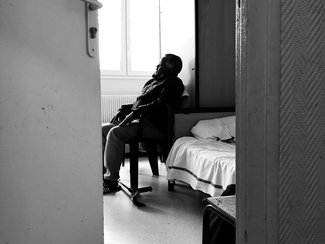After fleeing his homeland Eritrea, Tekle lived for many years in Sudan. When the situation there became difficult, he decided to go to Europe through Libya. It was a difficult trip, mainly because of the way he and his fellow travellers were treated by the smugglers.
“They dropped us in the middle of the desert and left us with no water and no food. They didn’t tell us when they would come back for us. We spent that night and the next day with no food and no water.”
From that place the group was taken to a warehouse where they were locked up for three days. Finally, they reached Sirte on the sea cost, expecting to be able to board a boat to Europe. But it was here that their journey turned into a hellish nightmare compared to which the trials in the desert were child’s play. They were kidnapped by an armed group pledging allegiance to Daesh (ISIS). Tekle and the others knew what was waiting for them. They had seen pictures on social media of people caught by Daesh (ISIS) in Libya being killed.
“When they told us they were Daesh, we didn’t ask for food or water, as we knew we were going to be killed. I had seen this place on Facebook. It’s where 33 Eritreans and Ethiopians were beheaded… We prepared ourselves to be sacrificed like lambs to the slaughter.”
– “My eyes didn’t go blind right away. I started to lose my sight day by day. I told the Arab speakers I was turning blind. They said, you are going to be slaughtered anyway. So why do you need your eyes? We were just waiting to be killed. We didn’t know exactly when and we were just waiting for it to happen. When we would hear their footsteps, we thought they were coming to end our lives.”Because he was the only one in the group speaking fluent Arabic, the kidnappers chose him to be the spokesperson of the group. They demanded that he should point out the persons in the group according to their nationality. When he refused, he was so badly beaten that he lost consciousness and after waking up, the beating continued. As a result of the brutal beating, Tekle’s eyesight started to deteriorate. He realized he was gradually going blind.
Then something unexpected happened. Fighting erupted in the vicinity and the terrorists fled, abandoning their prisoners. Tekle and his group were able to contact their smuggler, who rescued them and put them on a boat to Europe.
Tekle is now living in France. His dream of a better future in Europe has turned to ashes. He is a physically broken man, the beatings he suffered made him blind and he must walk with crutches. He has only one message to those planning to travel through Libya:
“When people die in the Sahara, their bodies are left behind like useless tools. That’s why people shouldn’t even think of crossing through Libya or the Sahara.”

